
The Original Dixieland Jass Band (ODJB) was a Dixieland jazz band that made the first jazz recordings in early 1917. Their "Livery Stable Blues" became the first jazz record ever issued. The group composed and recorded many jazz standards, the most famous being "Tiger Rag". In late 1917 the spelling of the band's name was changed to Original Dixieland Jazz Band.

Dominic James "Nick" LaRocca, was an early jazz cornetist and trumpeter and the leader of the Original Dixieland Jass Band. He is the composer of one of the most recorded jazz classics of all-time, "Tiger Rag". He was part of what is generally regarded as the first recorded jazz band, a band which recorded and released the first jazz recording, "Livery Stable Blues" in 1917.
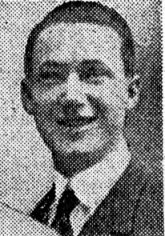
Lawrence James "Larry" Shields was an early American dixieland jazz clarinetist. He was a member of the Original Dixieland Jazz Band, the first jazz band to record commercially.

Edwin Branford "Eddie" Edwards was an early jazz trombonist who was a member of the Original Dixieland Jass Band.

"Tiger Rag" is a jazz standard that was recorded and copyrighted by the Original Dixieland Jass Band in 1917. It is one of the most recorded jazz compositions. In 2003, the 1918 recording of "Tiger Rag" was entered into the U.S. Library of Congress National Recording Registry.

Henry W. Ragas was a jazz pianist who was a member of the Original Dixieland Jazz Band, the first jazz band to record commercially.
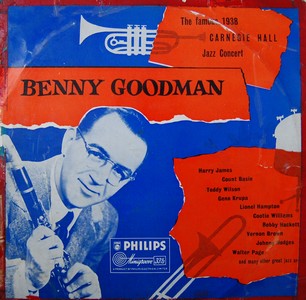
The Famous 1938 Carnegie Hall Jazz Concert by Benny Goodman, Columbia Records catalogue item SL-160, is a two-disc LP of swing and jazz music recorded at Carnegie Hall in New York City on January 16, 1938. First issued in 1950, the landmark recording captured the premiere performance given by a big band in the famed concert venue. The event has been described as "the single most important jazz or popular music concert in history: jazz's 'coming out' party to the world of 'respectable' music." Both critical and public reception of the performances was outstanding.
Benny Krueger was an American jazz saxophonist.

"Palesteena", or, "Lena from Palesteena", was a 1920 song, with lyrics by Con Conrad, and music by J. Russell Robinson.
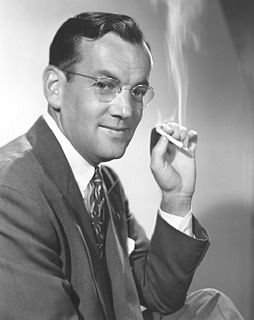
Between 1938 and 1944, Glenn Miller and His Orchestra released 266 singles on the monaural ten-inch shellac 78 rpm format. Their studio output comprised a variety of musical styles inside of the Swing genre, including ballads, band chants, dance instrumentals, novelty tracks, songs adapted from motion pictures, and, as the Second World War approached, patriotic music.
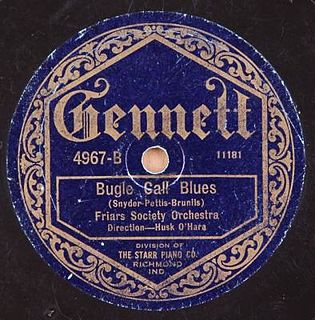
"Bugle Call Rag", also known as "Bugle Call Blues", is a jazz standard written by Jack Pettis, Billy Meyers and Elmer Schoebel. It was first recorded by the New Orleans Rhythm Kings in 1922 as "Bugle Call Blues", although later renditions as well as the published sheet music and the song's copyright all used the title "Bugle Call Rag".

"Margie", also known as "My Little Margie", is a 1920 popular song composed in collaboration by vaudeville performer and pianist Con Conrad and ragtime pianist J. Russel Robinson, a member of the Original Dixieland Jazz Band. Lyrics were written by Benny Davis, a vaudeville performer and songwriter. The song was introduced by the Original Dixieland Jazz Band in 1920 as Victor 78, 18717-A, in a medley paired with "Singin' the Blues". The B side was "Palesteena". The ODJB recorded their instrumental version on December 1, 1920.
Other popular versions in 1920-21 were by Gene Rodemich; Eddie Cantor; Ted Lewis; and Frank Crumit. The Rega Dance Orchestra recorded the song in October, 1920 for Okeh Records, 4211.

"Livery Stable Blues" is a jazz composition copyrighted by Ray Lopez (né Raymond Edward Lopez; 1889–1979) and Alcide Nunez in 1917. It was recorded by the Original Dixieland Jass Band on February 26, 1917, and, with the A side "Dixieland Jass Band One-Step" or "Dixie Jass Band One-Step", became widely acknowledged as the first jazz recording commercially released. It was recorded by the Victor Talking Machine Company in New York City at its studio at 46 West 38th Street on the 12th floor – the top floor.

"At the Jazz Band Ball" is a 1917 jazz instrumental recorded by the Original Dixieland Jazz Band. The instrumental is one of the earliest and most recorded jazz compositions. The song is a jazz classic and a standard of the genre.

"Wang Wang Blues" is a 1920 jazz composition written by Henry Busse, Gussie Mueller, and Theron E. "Buster" Johnson, with lyrics by Leo Wood. The song was released as a 78 single by Paul Whiteman and his Orchestra featuring Henry Busse on trumpet. The song is a pop and jazz standard.

Clarinet Marmalade, later Clarinet Marmalade Blues, is a 1918 dixieland jazz standard composed by Larry Shields and Henry Ragas of the Original Dixieland Jass Band. It is played in the key of F major. It was recorded by Fletcher Henderson in 1926 and Frankie Trumbauer in 1927.

"Singin' the Blues" is a 1920 jazz composition by J. Russel Robinson, Con Conrad, Sam M. Lewis, and Joe Young. It was recorded by the Original Dixieland Jass Band in 1920 as an instrumental and released as a Victor 78 as part of a medley with "Margie". The song was released with lyrics by vocalist Aileen Stanley in 1920 on Victor. In 1927, Frank Trumbauer, Bix Beiderbecke, and Eddie Lang recorded and released the song as an Okeh 78. The Trumbauer recording is considered a jazz and pop standard, greatly contributing to Frank Trumbauer and Bix Beiderbecke's reputation and influence. It is not related to the 1956 pop song "Singing the Blues" first recorded and released by Marty Robbins in 1956.
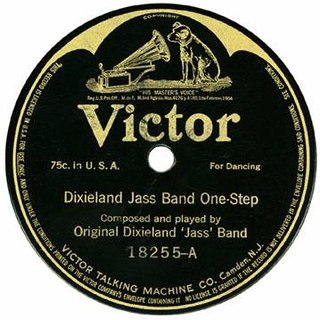
"Dixieland Jazz Band One-Step" also known as "Dixie Jass Band One-Step" and "Original Dixieland One-Step" is a 1917 jazz composition by the Original Dixieland Jass Band released as an instrumental as a Victor 78. The song is a jazz milestone as the first commercially released "jass" or jazz song.

Ostrich Walk" is a 1917 jazz composition by the Original Dixieland Jass Band released as an instrumental as an Aeolian Vocalion and a Victor 78. Frankie Trumbauer and Bix Beiderbecke recorded the song in 1927. The song is a jazz milestone as one of the first commercially released "jass" or jazz recordings.

Boogie Woogie is a compilation album containing four 10-inch, 78 rpm records of Boogie-woogie music. The songs on the album were recorded over a period of three years from 1936 to 1939, then released in 1941 on this compilation album by Columbia Records (C44). Artists featured on the album include Harry James, Count Basie, Big Joe Turner, and the three prominent boogie-woogie pianists of the time, Albert Ammons, Pete Johnson, and Meade Lux Lewis.




















